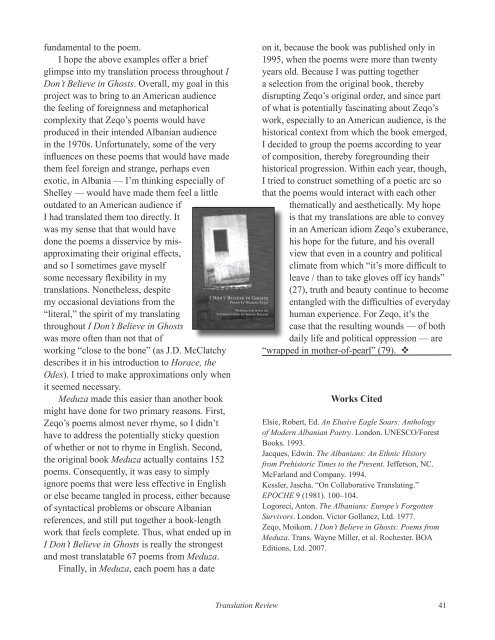Table of contents - The University of Texas at Dallas
Table of contents - The University of Texas at Dallas
Table of contents - The University of Texas at Dallas
You also want an ePaper? Increase the reach of your titles
YUMPU automatically turns print PDFs into web optimized ePapers that Google loves.
fundamental to the poem.<br />
I hope the above examples <strong>of</strong>fer a brief<br />
glimpse into my transl<strong>at</strong>ion process throughout I<br />
Don’t Believe in Ghosts. Overall, my goal in this<br />
project was to bring to an American audience<br />
the feeling <strong>of</strong> foreignness and metaphorical<br />
complexity th<strong>at</strong> Zeqo’s poems would have<br />
produced in their intended Albanian audience<br />
in the 1970s. Unfortun<strong>at</strong>ely, some <strong>of</strong> the very<br />
influences on these poems th<strong>at</strong> would have made<br />
them feel foreign and strange, perhaps even<br />
exotic, in Albania — I’m thinking especially <strong>of</strong><br />
Shelley — would have made them feel a little<br />
outd<strong>at</strong>ed to an American audience if<br />
I had transl<strong>at</strong>ed them too directly. It<br />
was my sense th<strong>at</strong> th<strong>at</strong> would have<br />
done the poems a disservice by misapproxim<strong>at</strong>ing<br />
their original effects,<br />
and so I sometimes gave myself<br />
some necessary flexibility in my<br />
transl<strong>at</strong>ions. Nonetheless, despite<br />
my occasional devi<strong>at</strong>ions from the<br />
“literal,” the spirit <strong>of</strong> my transl<strong>at</strong>ing<br />
throughout I Don’t Believe in Ghosts<br />
was more <strong>of</strong>ten than not th<strong>at</strong> <strong>of</strong><br />
working “close to the bone” (as J.D. McCl<strong>at</strong>chy<br />
describes it in his introduction to Horace, the<br />
Odes). I tried to make approxim<strong>at</strong>ions only when<br />
it seemed necessary.<br />
Meduza made this easier than another book<br />
might have done for two primary reasons. First,<br />
Zeqo’s poems almost never rhyme, so I didn’t<br />
have to address the potentially sticky question<br />
<strong>of</strong> whether or not to rhyme in English. Second,<br />
the original book Meduza actually contains 152<br />
poems. Consequently, it was easy to simply<br />
ignore poems th<strong>at</strong> were less effective in English<br />
or else became tangled in process, either because<br />
<strong>of</strong> syntactical problems or obscure Albanian<br />
references, and still put together a book-length<br />
work th<strong>at</strong> feels complete. Thus, wh<strong>at</strong> ended up in<br />
I Don’t Believe in Ghosts is really the strongest<br />
and most transl<strong>at</strong>able 67 poems from Meduza.<br />
Finally, in Meduza, each poem has a d<strong>at</strong>e<br />
on it, because the book was published only in<br />
1995, when the poems were more than twenty<br />
years old. Because I was putting together<br />
a selection from the original book, thereby<br />
disrupting Zeqo’s original order, and since part<br />
<strong>of</strong> wh<strong>at</strong> is potentially fascin<strong>at</strong>ing about Zeqo’s<br />
work, especially to an American audience, is the<br />
historical context from which the book emerged,<br />
I decided to group the poems according to year<br />
<strong>of</strong> composition, thereby foregrounding their<br />
historical progression. Within each year, though,<br />
I tried to construct something <strong>of</strong> a poetic arc so<br />
th<strong>at</strong> the poems would interact with each other<br />
them<strong>at</strong>ically and aesthetically. My hope<br />
is th<strong>at</strong> my transl<strong>at</strong>ions are able to convey<br />
in an American idiom Zeqo’s exuberance,<br />
his hope for the future, and his overall<br />
view th<strong>at</strong> even in a country and political<br />
clim<strong>at</strong>e from which “it’s more difficult to<br />
leave / than to take gloves <strong>of</strong>f icy hands”<br />
(27), truth and beauty continue to become<br />
entangled with the difficulties <strong>of</strong> everyday<br />
human experience. For Zeqo, it’s the<br />
case th<strong>at</strong> the resulting wounds — <strong>of</strong> both<br />
daily life and political oppression — are<br />
“wrapped in mother-<strong>of</strong>-pearl” (79). v<br />
Works Cited<br />
Elsie, Robert, Ed. An Elusive Eagle Soars: Anthology<br />
<strong>of</strong> Modern Albanian Poetry. London. UNESCO/Forest<br />
Books. 1993.<br />
Jacques, Edwin. <strong>The</strong> Albanians: An Ethnic History<br />
from Prehistoric Times to the Present. Jefferson, NC.<br />
McFarland and Company. 1994.<br />
Kessler, Jascha. “On Collabor<strong>at</strong>ive Transl<strong>at</strong>ing.”<br />
EPOCHE 9 (1981). 100–104.<br />
Logoreci, Anton. <strong>The</strong> Albanians: Europe’s Forgotten<br />
Survivors. London. Victor Gollancz, Ltd. 1977.<br />
Zeqo, Moikom. I Don’t Believe in Ghosts: Poems from<br />
Meduza. Trans. Wayne Miller, et al. Rochester. BOA<br />
Editions, Ltd. 2007.<br />
Transl<strong>at</strong>ion Review 41

















